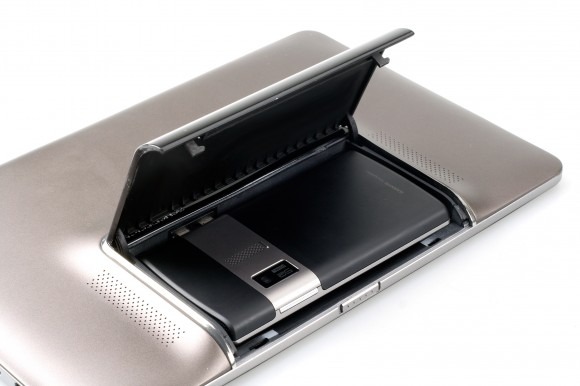ASUS Padfone: Twice As Appealing Or Doubly-Dumb?
Maybe it was too many Transformers toys when I was younger, or because I have a frustrated engineer inside me, but I – like plenty of others – can't take my eyes off the ASUS Padfone. The new tablet/smartphone hybrid, fresh (after a leak or two) to Computex 2011 this morning, taps into a geeky, childish "slot this gadget into that gadget and make it better overall" mindset that also left us jonesing for an ATRIX after CES. Question is, after the lust fades, does the reality the Padfone offers actually bear up?
You can see where ASUS' argument in favor of the Padfone is coming from. Just like the ATRIX, it asks why we should bother carrying – and paying for – a separate processor and 3G modem in both our phone and our bigger-screen device, whether that be a Laptop Dock as with the Motorola Phone or the tablet shell of the ASUS. Instead, let the phone bring the brain and the connectivity and dock it into a dumb companion: presumably cheaper to buy, cheaper to run since you only need one data plan, and more streamlined since you have one data store not files and media spread across two gadgets.
That's great, but there's short- and long-term compatibility to think about. Of course, the tablet husk will only work with ASUS' specific smartphone – the microUSB and microHDMI ports are standard, but we're guessing there's some sort of proprietary data protocol to make everything work together – which means that when the Padfone launches it'll only be of interest to those who like both halves of the equation. If you'd rather stick with your Galaxy S II, for instance, or even have a preference for another OS like Windows Phone or iOS, you're out of luck.
That's in the short-term, but the longer-term support for the Padfone still isn't decided yet. ASUS has apparently said it's considering whether its future smartphones will be compatible with the same tablet hardware, but nothing is decided yet; without such a reassurance, you could be left having to replace both your phone and tablet simultaneously rather than piecemeal as each gets superseded.

No, the more I think about it, my real excitement today is around the processor milestone. Although we've seen concept hybrid devices before – slotting a phone into a tablet or laptop shell – it's only recently that the performance/battery balance of modern chipsets has got to the stage where they make sense. I'm not saying the Padfone design is necessarily a winner, but simply that – functional and usability quibbles aside – the concept isn't let down by underwhelming performance.
NVIDIA's video demo of Kal-El only adds to that enthusiasm. Quad-cores, the sort of dynamic lighting processing – courtesy of a twelve-core GPU, no less – you'd previously associate with a gaming desktop and the promise of sufficient power frugality to make tablet or other mobile device applications realistic. We've come to expect demonstrations like that to be accompanied by a years-long roadmap, but NVIDIA is saying Kal-El based products could be here as soon as August.
The success of the Padfone – at least in the state ASUS has shown it today – will likely depend on price. The company has demonstrated it can compete in that arena, with the Eee Pad Transformer, but phones are arguably more complex when it comes to retail. Will the two Padfone parts be sold SIM-free and unlocked, and if so can ASUS match the competitive Transformer so that its two-part product doesn't come at a price disadvantage? If it's subsidized, can ASUS persuade the carriers – and build the Padfone to a suitably affordable starting point – to offer it at a figure that's in line with other high-end smartphones? Will it demand a tethering plan, like the Motorola ATRIX and its Laptop Dock?
There are plenty of questions left, and ASUS has given itself a whole lot of wriggle room between now and the tentative Q4 2011 release date. Specs aren't decided, final design hasn't been signed off, and there's still time to cancel the whole project altogether if the reception is less glowing than expected. The Padfone is definitely shaping up to be a niche product, but then again that's what ASUS thought about the Transformer, and then promptly sold out. I don't think ASUS has quite nailed the "best of both devices" premise, but I'm glad to see companies thinking outside the norm and taking advantage of the possibilities the new breed of chips allow.
Disagree with me? Reckon the ASUS Padfone is the best thing since modular sliced-bread? Let me know your thoughts in the comments.
